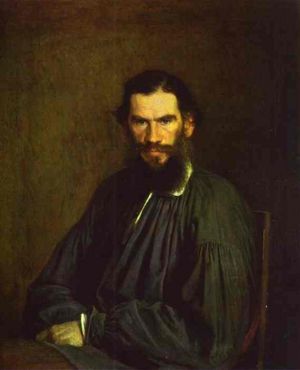Anarchism
 From Conservapedia - Reading time: 4 min
From Conservapedia - Reading time: 4 min
Anarchism is a political philosophy advocating the removal of the State and the establishment of a society without government. The term is of Greek origin (coming from the word "αναρχία" (anarchia), meaning "without rulers" or "without order".) Anarchists oppose the use of prisons. Anarchists tend to oppose any form of government, but can be found expressing support for direct democracy, freedom of speech, de-centralism, individualism and anti-authoritarianism.
Anarchists have traditionally been irreligious/anti-religion/atheists (see: Atheism and anarchism).[1]
Anarchists generally oppose what Noam Chomsky has termed "illegitimate authority". Most anarchists consider the state and other coercive entities illegitimate.
Although Anarchism is considered in some instances to be right-wing, due to it effectively being the opposite of left-wing ideals such as totalitarian government and government expansion, it should be noted that most anarchists were explicitly left-wing in their outlook, including Chomsky as noted above, as well as Jean-Paul Sartre, Michel Foucault, Bill Ayers, as well as Sacco and Vanzetti and various people belonging to the New Left as they generally oppose capitalism. In addition, Karl Marx, when advocating for communism/socialism, iterated one of the endgoals as being a "stateless society", which meant he advocated for anarchism. In fact, Pierre-Joseph Proudhon, the French politician who first used the term "anarchist" in reference to himself, denounced capitalism by declaring "property is theft" and otherwise held several leftist views (including anti-Semitism).
Contents
Traditional anarchism[edit]
Traditional anarchism is similar to communism, though unlike communism, traditional anarchists do not favor socialism as a means to their end, as it requires a state. Traditional anarchists advocate the formation of collectives. Traditional anarchism rejects all authority, both of business and of government.
Types of anarchism[edit]
Christian anarchism[edit]
Christianity has been influential on some anarchists. Russian novelist Leo Tolstoy is an important figure in this trend. Tolstoy's Christian anarchism was outlined in his book The Kingdom of God is Within You. Like all Christian anarchists, he believed that the only authority is God, therefore government is illegitimate. To support their views, Christian anarchists quote the following passage by Paul:
| “ | "There is no authority except that which God has established." | ” |
Anarcho-syndicalism[edit]
Anarcho syndicalism is the most influential branch of anarchism worldwide, partly due to the syndicalists' involvement in the Spanish Civil War. Anarcho-syndicalism emphasizes workers' rights and trade unionism. In a syndicalist society workers would be self-managing, and a union of all workers would take the place of government. Syndicalism is not firmly opposed to the currency or trade of capitalism like most other branches. Famous anarcho-syndicalists are Noam Chomsky, Buenaventura Durruti and Georges Sorel.
Individualist anarchism[edit]
Unlike many forms of traditional anarchism, individualist anarchism does not, in a sense, advocate collectivism. Many individualist anarchists argue that both collective and individual freedom can go hand-in-hand. Individualist anarchists differ on the issues of private property and other rights.
Anarcho-capitalism[edit]
For a more detailed treatment, see Anarcho-capitalism.
Anarcho-capitalism is a form of individualist anarchism that favors private police agencies, security companies, and arbitration as opposed to government. Anarcho-capitalism is the most extreme form of libertarianism.
Traditional anarchists argue that anarcho-capitalists are not true anarchists. This is due to the anarcho-capitalists' support of the supposed authority of business and private property. Traditional anarchists argue that one cannot live without wages under a capitalist system.
Anarcho-capitalists argue that all support of business is voluntary, since one can choose between companies or create their own under a capitalist system. Anarcho-capitalists reject collectives, since they focus on the community rather than the individual, which may lead to a loss of individual freedom.
Green anarchism[edit]
Green anarchists oppose the hierarchy, in which the human stands about the animal.
Anarcho-Nihilism[edit]
Anarcho-Nihilism is the view to destroy any and all forms of order and leave it in total lawlessness and lacking any restraints, especially the removal of Western order. Considered left-wing and is sometimes affiliated with Cultural Marxism. A notable example of this type of anarchism is from the Matrix trilogy. Another example is the Russian Nihilist movement.
Anarchism in practice[edit]
Anarchism ranges through a number of different ideologies and practices. Some anarchists limit themselves to peaceful marches. Most refrain from voting. Others lead an insurrectionist lifestyle, which can include throwing rocks through Starbucks windows, yelling expletives at policemen, hacking into white nationalist or neo-Nazi websites, forming black blocs at national protests, and generally wreaking havoc on the system they are fighting against.
During the Spanish Civil War there occurred in the Republican areas a "Spanish Revolution". It involved the taking over of workplaces by those who worked in them. Industry began to be organized non-hierarchically. The anarchist union the CNT did this with considerable success.
During the Russian Civil War the Ukrainian Nestor Makhno established an Anarchist Society, that was destroyed by the Red Army in 1920.
Anarchists also tended to think that even the concept of the law, especially enforcing it, as well as national borders, was considered "state-sanctioned violence" and thus generally protested against it.[2]
Americans, anarchism and atheism[edit]
See also: Sociology of "atheism is un-American" view and American atheism
Charles Louis Richter declared in his interview with the International Society for Historians of Atheism, Secularism, and Humanism (ISHASH) about America and atheism:
| “ | The turn of the century ended the golden age of nineteenth century freethought with two events: the death of Robert Ingersoll in 1899, and the assassination of President William McKinley in 1901. The lack of a widely popular voice for irreligion, combined with the murder of the president by an anarchist, led to a backlash against not only anarchism but also atheism. From that point, Americans tended to see irreligion in terms of whatever ostensibly foreign ideology seemed most threatening. So for the rest of the century, we see atheism and atheists associated with anarchism, fascism, socialism, and of course Soviet-style communism. By the late seventies, secular humanism became the buzzword for a whole suite of threats not only to religion, but to Americanism. It’s important to note that this phenomenon is not limited to the political or religious right; liberals also framed irreligion as un-American.[3] | ” |
Other uses[edit]
In addition to being a philosophy, anarchy can also be a description of a system in which there is no higher governmental authority. The world level of political interaction is considered anarchical, because there is no power over the sovereign states (i.e. there is no world government).
See also[edit]
References[edit]
- ↑ Nicolas Walter. "Anarchism and Religion"
- ↑ https://www.frontpagemag.com/fpm/270964/new-anne-frank-play-casts-ice-nazis-matthew-vadum
- ↑ ISHASH MEMBER INTERVIEW: CHARLES LOUIS RICHTER, International Society for Historians of Atheism, Secularism, and Humanism
External links[edit]
- An Anarchist FAQ - From a traditional anarchist point of view.
- Ludwig von Mises Institute - Promotes Austrian economics as well as anarcho-capitalism.
- What Liberals Say - Category: Anarchy, Accuracy In Media
 KSF
KSF

